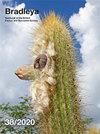Raymond Hamet(1890–1972)的锦鸡科(景天科锦鸡亚科)
IF 1.2
4区 生物学
Q3 PLANT SCIENCES
引用次数: 6
摘要
摘要:在多样化的研究和职业生涯中,Raymond Hamet(1890年3月25日[法国科尔的第戎]至1972年10月2日[法国巴黎])是卡兰乔阿丹属的国际专家。(景天科)。15岁时,他出版了他的第一个新物种卡兰乔,18岁时,她已经出版了一本对该属的全面修订本,其中引用了当时几乎所有关于该属的文献,以及一本由许多草药学家持有并从中获得的大量Exiccata。在57年的时间里,Raymond Hamet描述并重新分类了60多种卡兰乔属物种,其中大部分来自马达加斯加,也有一些来自世界其他地区,并在该属中提出了几个新名称,后来被其他研究人员有效发表。对Raymond Hamet关于卡兰乔的工作进行了分析和评价,包括他描述并重新归类于该属的物种。新组合Kalanchoe beauverdii Raym-Hamet var.juelii(Raym.-Hamet&H.Perrier)Gideon F.Sm.&Figueiredo最近出版,此前Rauh&Hebding在1995年的一次尝试没有成功。名字叫K·觉利·拉姆-Hamet&H.Perrier,Kalanchoe beauverdii var.juelii的basionym,是组合形成时的典型。本文章由计算机程序翻译,如有差异,请以英文原文为准。
The kalanchoes (Crassulaceae subfam. Kalanchooideae) of Raymond-Hamet (1890–1972)
Summary: During a diverse research and professional career, Raymond-Hamet (25 March 1890 [Dijon, Côte D'Or, France]–2 October 1972 [Paris, France]) was, inter alia, an international expert on the genus Kalanchoe Adans. (Crassulaceae). At the age of 15 he published his first new species of Kalanchoe, and at the age of 18 he had already published a comprehensive revision of the genus, replete with the citation of virtually all the literature available on the genus at the time, as well as a voluminous exsiccata held by and derived from numerous herbaria. Over a period of 57 years Raymond-Hamet described and reclassified more than 60 species of Kalanchoe, mostly from Madagascar but some also from other parts of the world, and additionally proposed several new names in the genus that were later validly published by other researchers. An analysis and appreciation of Raymond-Hamet's work on Kalanchoe, including of the species he described and reclassified in the genus are provided. The new combination Kalanchoe beauverdii Raym.-Hamet var. juelii (Raym.-Hamet & H.Perrier) Gideon F.Sm. & Figueiredo was recently published after a previous attempt by Rauh & Hebding, in 1995, was not successful. The name K. juelii Raym.-Hamet & H.Perrier, basionym of Kalanchoe beauverdii var. juelii, was typified when the combination was made.
求助全文
通过发布文献求助,成功后即可免费获取论文全文。
去求助
来源期刊

Bradleya
PLANT SCIENCES-
CiteScore
2.80
自引率
25.00%
发文量
43
审稿时长
>12 weeks
期刊介绍:
Bradleya is the BCSS contribution to the scientific world and is accepted as such because of its academic standards. It can only flourish with the support of BCSS members, many of whom subscribe to it each year. The aim is to include articles which our members will find interesting and educational, whilst retaining rigorous standards of publication. Scientifically important articles don''t have to be dull to read. So, because Bradleya depends the subscriber, the editor endeavours to make its contents accessible, easily understood and enjoyable for all.
 求助内容:
求助内容: 应助结果提醒方式:
应助结果提醒方式:


